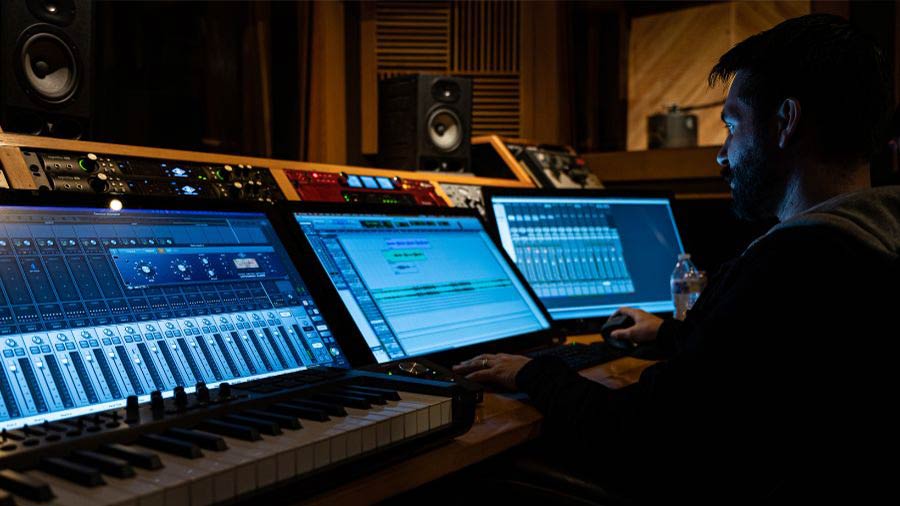The harmony between artificial intelligence and music creation is hitting a crescendo in a world where technology continues to dance with creativity. AI music generators, such as MusicFlow, Sound Draw, Boomy, Beatoven.ai, Loudly, Soundful, Suno.ai, AIVA, Soundraw, and VEED.io, are emerging as virtuoso collaborators, offering a new rhythm to the creative process for musicians.
1. MusicFlow
Imagine a digital symphony at your fingertips. MusicFlow embodies this idea, employing AI to compose unique melodies and harmonies. Musicians can tap into an expansive library of AI-generated tracks, inspiring or as a starting point for their compositions.
2. Sound Draw
Visualise your music coming to life on a canvas. Sound Draw merges the worlds of art and music, allowing musicians to draw shapes and patterns that are then transformed into musical notes. It's a playful yet innovative approach to composition, letting artists express themselves visually.
3. Boomy
Boomy is the beat-making companion every musician dreams of. With AI algorithms that understand your style and preferences, it crafts beats and compositions tailored to your unique sound. It's not just a tool; it's a collaborator that evolves with you.
4. Beatoven.ai
Cooking up beats with a dash of AI brilliance, Beatoven.ai is your virtual rhythm chef. It analyses your input and creates drum patterns that complement your style. It's a dynamic addition to any musician's toolkit, providing fresh beats that resonate with your creative vision.
5. Loudly
Loudly amplifies your creative voice. Using AI, it generates musical elements like melodies, chords, and basslines, allowing musicians to focus on the things that they do well making it easier to make music.
6. Soundful
Soundful is a playground where AI meets your imagination. It assists musicians in crafting melodies, harmonies, and rhythms. With an intuitive interface, it's not just a music generator; it's a companion for those seeking inspiration and experimentation.
7. Suno.ai
Suno.ai is the conductor orchestrating AI-generated compositions. Musicians can explore a variety of styles and moods, with the AI adapting to their preferences. It's a tool that understands the nuances of musical expression, creating a seamless collaboration between artist and machine.
8. AIVA
AIVA, or Artificial Intelligence Virtual Artist, is your AI composing partner. It doesn't just generate music; it composes full-fledged symphonies. AIVA learns your style, understands your inputs, and delivers compositions that sound straight from a seasoned composer's hand.
9. Soundraw
Sound raw takes the complexity out of music creation. It simplifies the process, allowing musicians to focus on their artistic vision while the AI takes care of the intricate details. It's a harmony of simplicity and sophistication, making music creation accessible to all.
10. VEED.io
VEED.io is the maestro of visual storytelling through music. While primarily a video editing tool, its AI capabilities extend to music. Musicians can enhance their visual content with AI-generated soundtracks, adding more emotion and depth to their creations.
In a world where the boundaries between man and machine blur, these AI music generators are more than just tools. They're companions, collaborators, and catalysts for musical innovation. Whether seasoned professionals or aspiring novices, musicians can harness AI's power to elevate their craft, breaking free from convention and exploring new landscapes. The melody makers of the future aren't just human or machine – they're a harmonious blend of both.
Could AI Be The Death of The Music Industry?
In a world driven by technological advancements, the role of artificial intelligence (AI) in various aspects of our lives has become increasingly high. The realm of music is one world where AI's influence sparks excitement and apprehension. The question arises: Will AI bring about the demise of traditional music, or will it pave the way for a new era of unprecedented creativity?
Two Perspectives of AI Music
As AI continues to evolve, it sparks a debate about its impact on human creativity in music. Some critics argue that it threatens human creation rendering human musicians obsolete. In contrast, supporters view AI as a revolutionary tool that can enhance and expand human creativity, exploring new musical possibilities. Many musicians now use AI as a collaborative tool, using algorithms to analyze vast datasets and uncover patterns, leading to unique combinations that inspire unique sounds.
One of AI's remarkable contributions to the music industry is its ability to personalise musical experiences. Streaming platforms and recommendation systems powered by AI algorithms can curate playlists tailored to individual preferences, introducing listeners to various artists and genres. This broadens music ensuring that every listener can find their preference in music.
The Rise of AI-Generated Music
AI-generated music has already made waves in various genres, from classical compositions to electronic beats. While some argue that this marks the beginning of the end for human creativity, others contend that these AI creations are tools for inspiration rather than replacements. Musicians can use AI-generated content as a starting point, infusing it with their emotions, experiences, and personal touches to craft something new.
Preserving the Human Touch
Despite AI's potential in music, many argue that machines can never replicate the essence of human emotion and intuition. Some view the imperfections, spontaneity, and realness that define human performances as irreplaceable elements that contribute to the soul of music.
The impact of AI on the future of music remains a topic of debate and exploration. Instead of predicting the death of music, AI could bring a new level of creativity, collaboration and innovation.
It may be possible for a partnership between humans and machines to find a balance that works but we do not think that it will evolve music much more as the next revolution may see AI simply as a tool that can be used or not. We believe that going back to simplicity without the crowded judgement of AI could be the best way forward.
Using Celebrities' Voices (AI Music Technology)
Artificial intelligence (AI) has impacted various industries in recent years, and the music industry is no exception. AI music technology has revolutionised how we create, produce, and experience music. With the power of AI, it is now possible to transform any song with celebrities' voices, giving artists and musicians a whole new level of creative freedom. However, doing this without consent from the musician could be illegal due to copyright and privacy issues.
How AI music works?
At its core, AI music combines machine learning algorithms with neural networks and language processing. These technologies allow AI systems to analyse vast amounts of data, including audio recordings, lyrics, and vocal patterns. By training AI models on this data, the systems can learn to mimic the voices of celebrities and generate new vocal tracks that seamlessly blend with existing songs.
The process begins by feeding the AI system with a database of celebrities' voices, which can be collected from interviews, speeches or movie dialogues. The system then analyses these voices, extracting unique vocal characteristics, tonalities, and nuances. Once the AI system has learned these patterns, it can generate new vocal tracks that mimic the voices of the chosen celebrities.
The impact of AI music on the music industry
The introduction of AI music technology has profoundly impacted the music industry. It has opened up a world of possibilities for both artists and listeners. Artists can now collaborate with their favourite celebrities, even if they are no longer alive or available for new recordings. This technology has also made experimenting with different genres and styles easier, allowing artists to push the boundaries of creativity.
For listeners, AI music offers a unique and personalised experience. It allows them to hear their favourite songs in a whole new way, with the voices of their beloved celebrities. This technology has also allowed the discovery of new artists and songs that may have gone unnoticed. The ability to transform any song with celebrities' voices has democratised the music industry, allowing everyone to create and enjoy music like never before.
Benefits of using AI music technology
The benefits of using AI music technology are plentiful. For artists, it provides a platform for collaboration with celebrities who may have never been accessible otherwise. This opens up new opportunities for artistic expression and creativity. Additionally, AI music technology saves time and resources by eliminating the need for costly studio sessions and hiring celebrity vocalists.
From a listener's perspective, AI music offers a fresh and exciting way to engage with music. Hearing their favourite songs with celebrities' voices can create a deep emotional connection and enhance the listening experience. AI music technology also enables personalised playlists and recommendations based on individual preferences, making music discovery more tailored and enjoyable.
The process of transforming a song with celebrities' voices
Transforming a song with celebrities' voices may seem like a complex process, but with AI music technology, it has become more accessible than ever. The first step is to select the song you want to transform and identify the celebrity voices you wish to incorporate. Next, you need to gather a database of audio recordings of the chosen celebrities' voices.
Once you have the audio recordings, you can feed them into your chosen AI music software or tool. The software will analyse the celebrity voices' vocal patterns, tonalities, and nuances and learn to replicate them. With this information, the software can generate new vocal tracks that mimic the chosen celebrities' voices.
After generating the new vocal tracks, you can mix them with the original song using digital audio workstation (DAW) software. This lets you adjust volume levels, apply effects, and fine-tune the sound. Once you are satisfied with the transformation, you can export the song's final version, which now features the voices of your favourite celebrities.
Legal considerations and copyright issues in AI music transformation
While AI music technology offers exciting possibilities, it raises legal and copyright concerns. When transforming a song with celebrities' voices, it is crucial to ensure that you have the necessary rights and permissions. Using copyrighted material without proper authorisation can result in legal consequences.
To avoid copyright infringement, it is essential to obtain the appropriate licenses or ask permission from the copyright holders. This may involve negotiating with record labels, estate representatives, or celebrities. You must consult with legal professionals who specialise in intellectual property law to ensure compliance.
Tools and software for AI music transformation
With the rise of AI music technology, there are some exciting tools available that can help you transform songs using celebrities' voices. For instance, CelebVoiceAI specialises in replicating celebrity voices and seamlessly integrating them into existing tracks.
Then there's AI Music Transformer, which leverages deep learning algorithms to create new vocal tracks featuring your favorite stars. Another great option is VocalSynth, known for its versatile vocal synthesis capabilities, allowing users to easily manipulate and transform voices. All these tools come with user-friendly interfaces, making the transformation process accessible and enjoyable.
Future trends in AI music technology
As AI music technology evolves, we can expect several exciting trends to shape its future. One such trend is the improvement of voice synthesis algorithms, leading to even more realistic and accurate celebrity voice replication. AI music technology is likely to become more accessible to artists and musicians, thanks to advancements in user-friendly software and tools.
Another emerging trend is integrating AI music technology with virtual reality (VR) and augmented reality (AR) platforms. This combination has the potential to create interactive music experiences, where users can not only listen to songs transformed with celebrities' voices but also visually engage with virtual representations of these celebrities.
Up Next: The Future of Musical Instruments












